Abstract
We predicted that, among mutants resistant to infection by single-stranded deoxyribonucleic acid viruses, there would be some also resistant to “infection” by single-stranded conjugal deoxyribonucleic acid. Approximately 5% of the Escherichia coli K-12 females selected for resistance to phage ST-1 were defective as recipients in conjugation. These spontaneous mutants fell into two classes. Type A accepted both plasmid and chromosomal markers at greatly reduced frequencies (<10−6 of normal for at least one strain), formed “rough” colonies, and (unlike their parent) were nonflagellated. Type B strains accepted both chromosomal and plasmid markers at reduced frequencies (10−2 to 10−1 of normal), were temperature sensitive for growth, and showed increased susceptibility towards antibiotics and deoxycholate. Both classes of mutants also were resistant to certain female-specific viruses.
Full text
PDF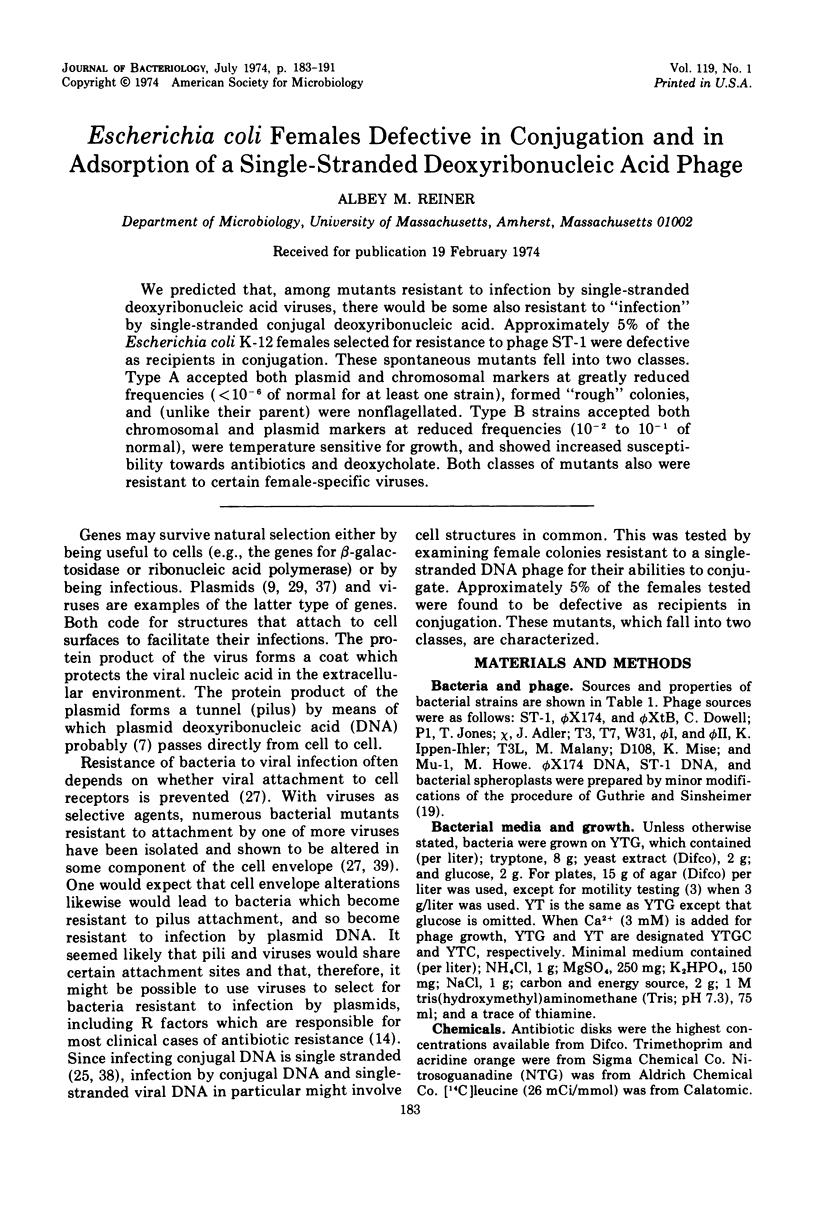
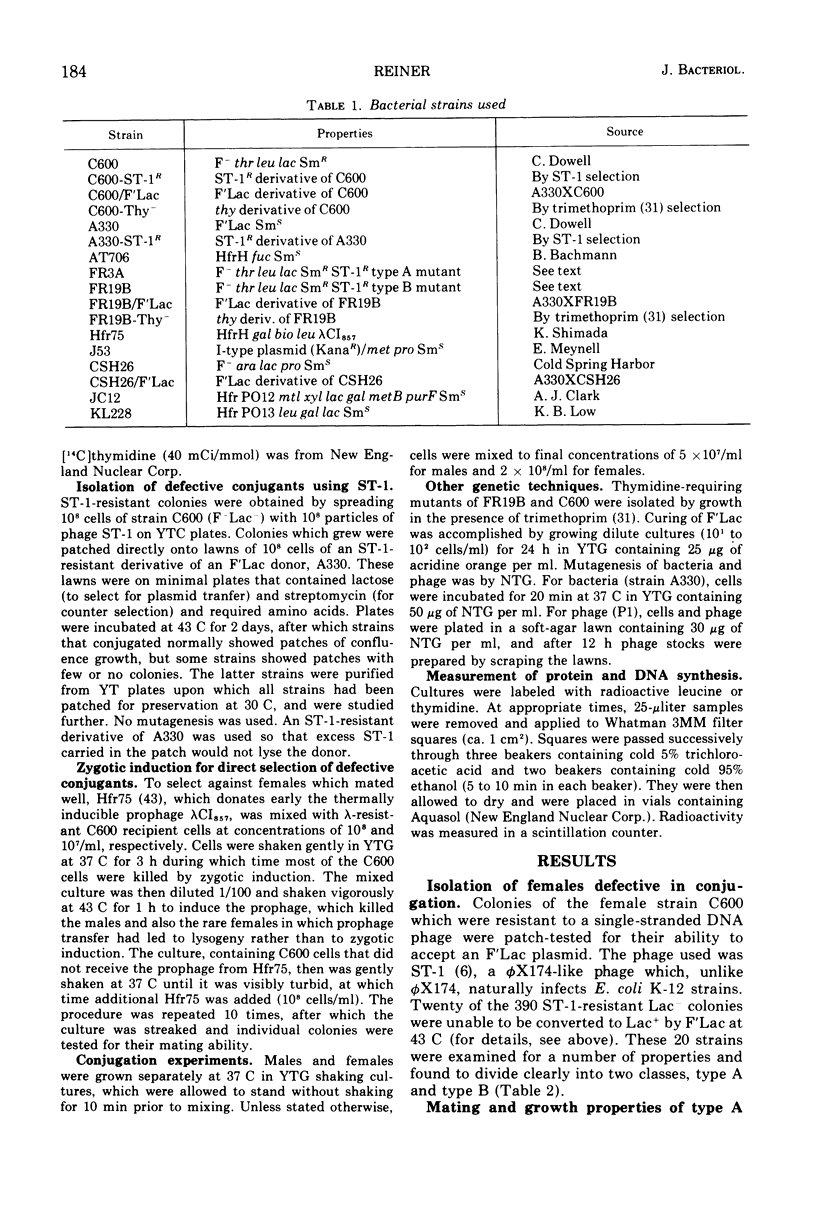
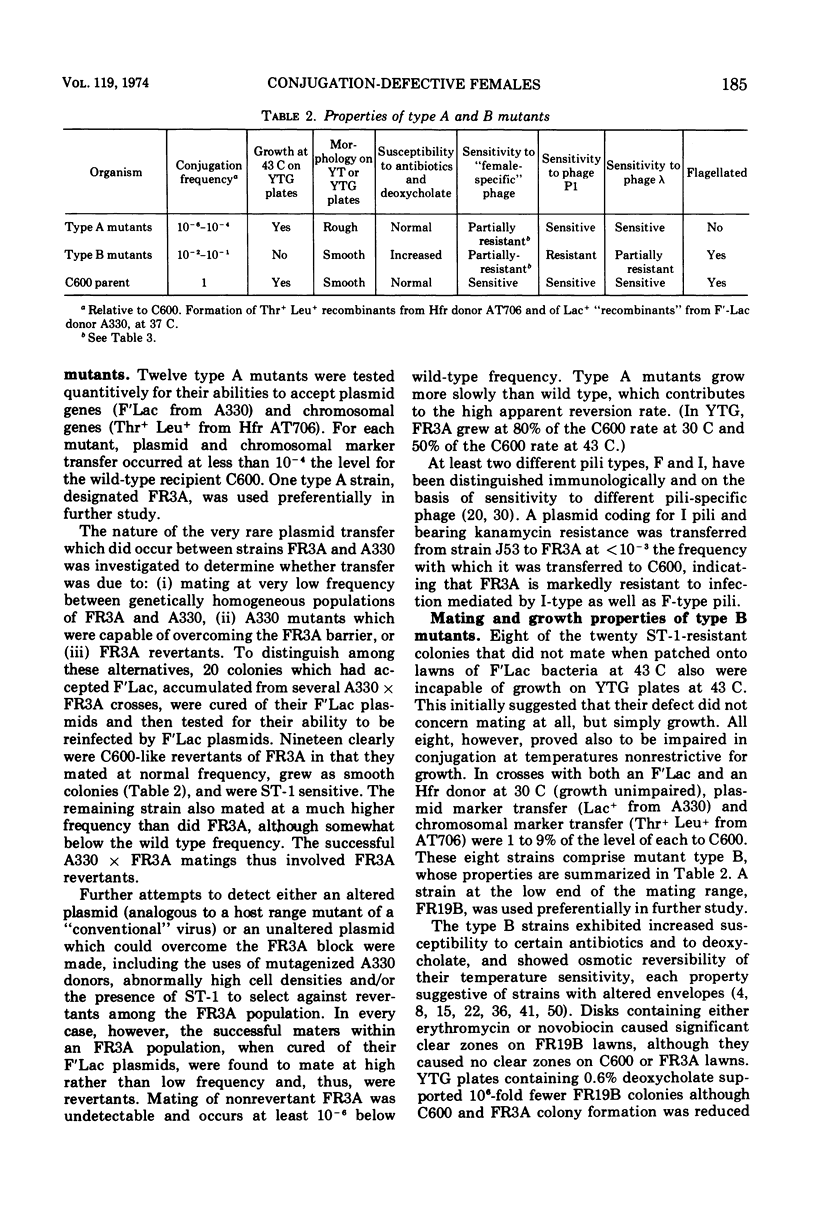
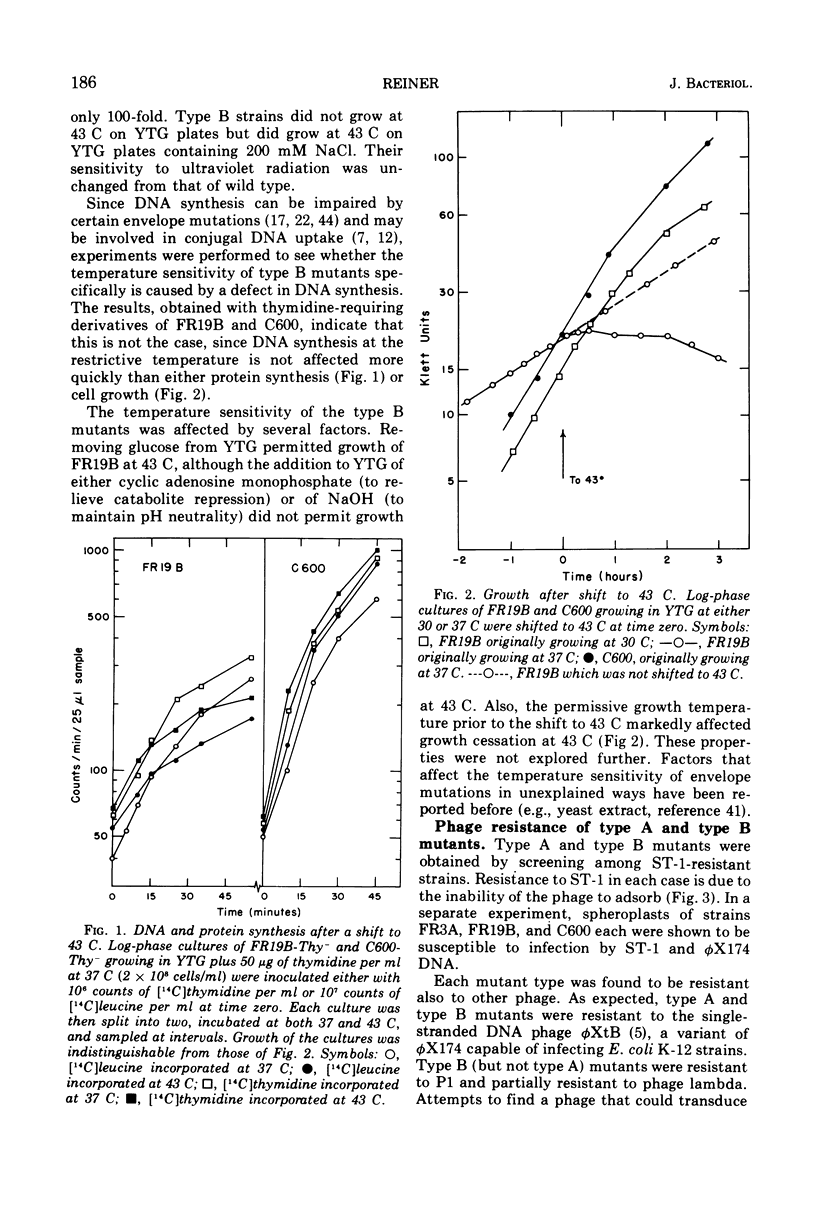
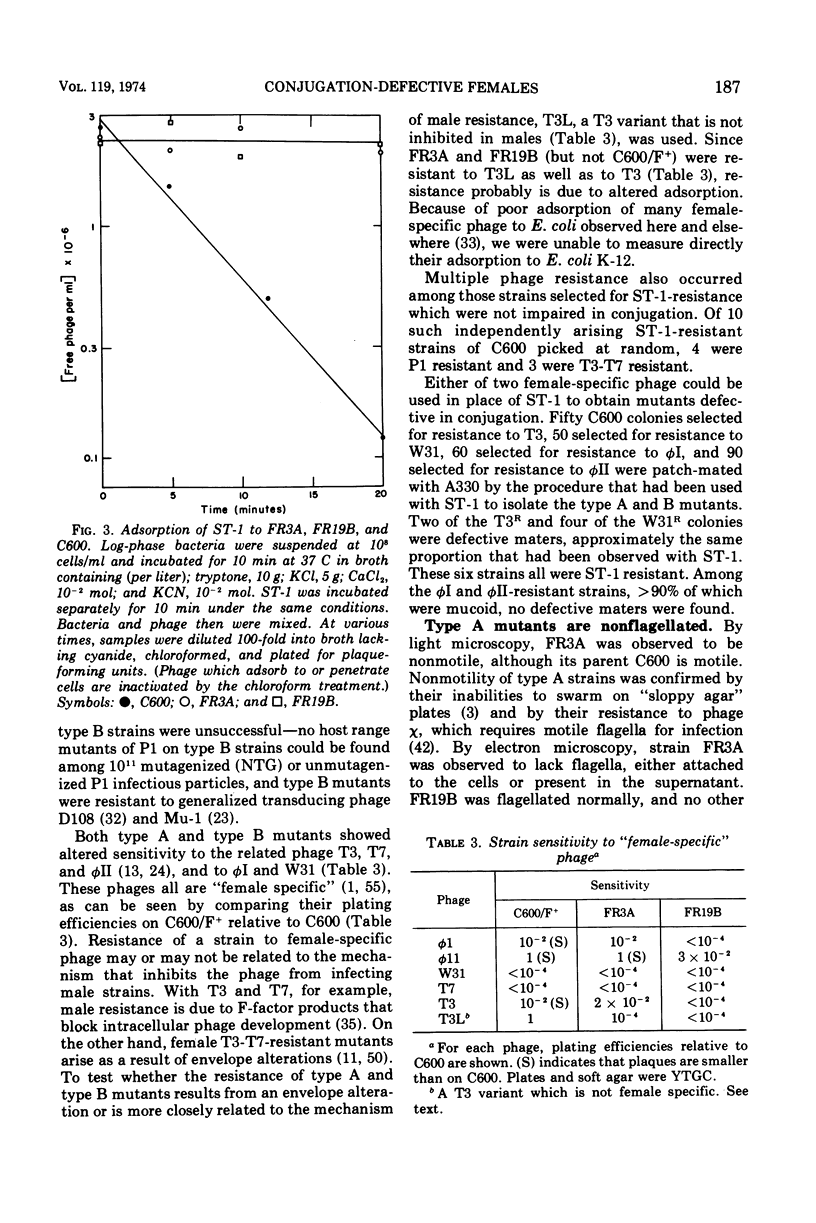
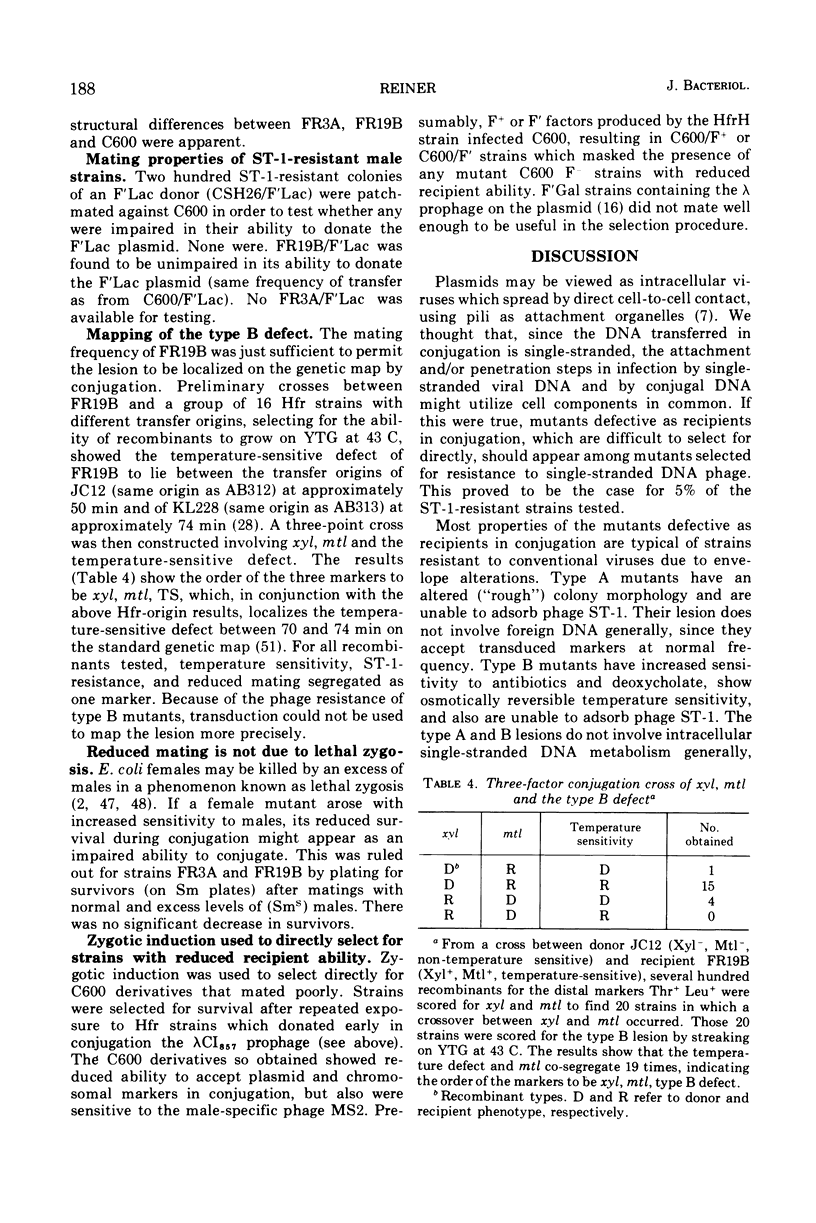
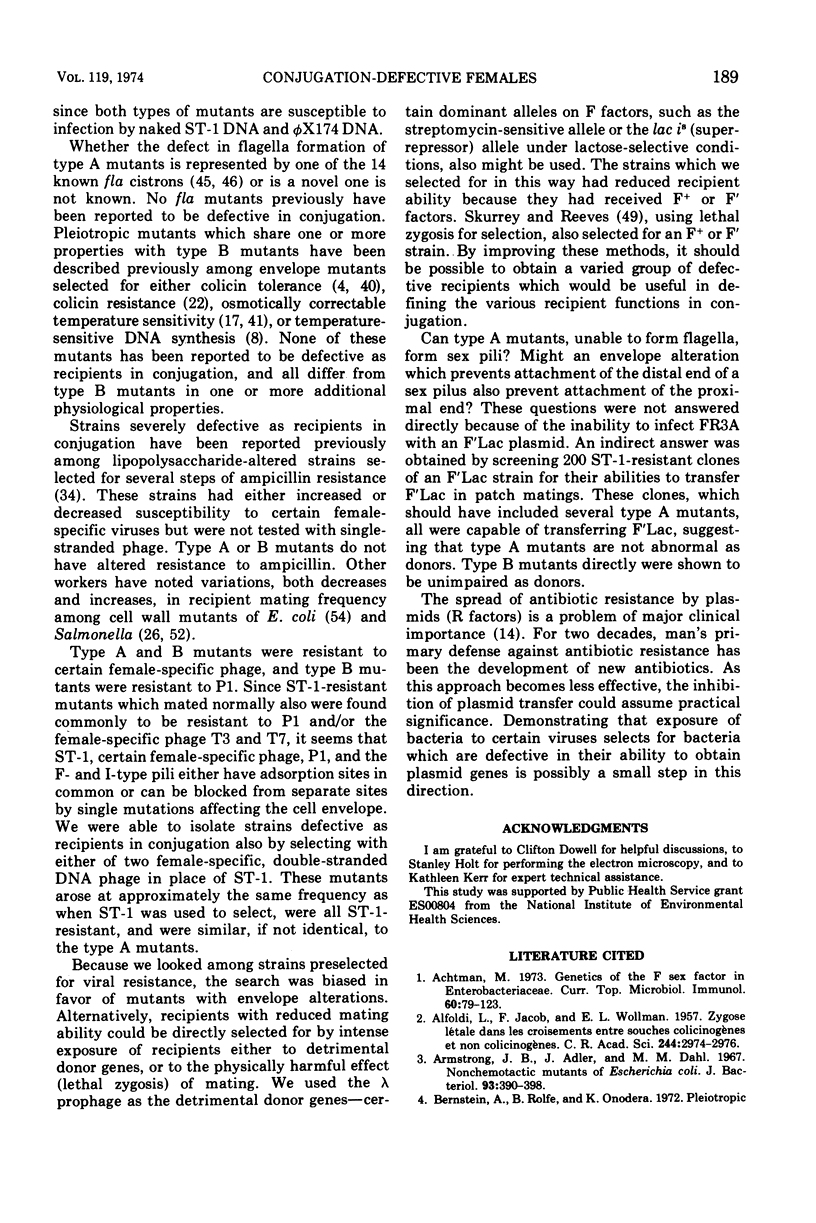
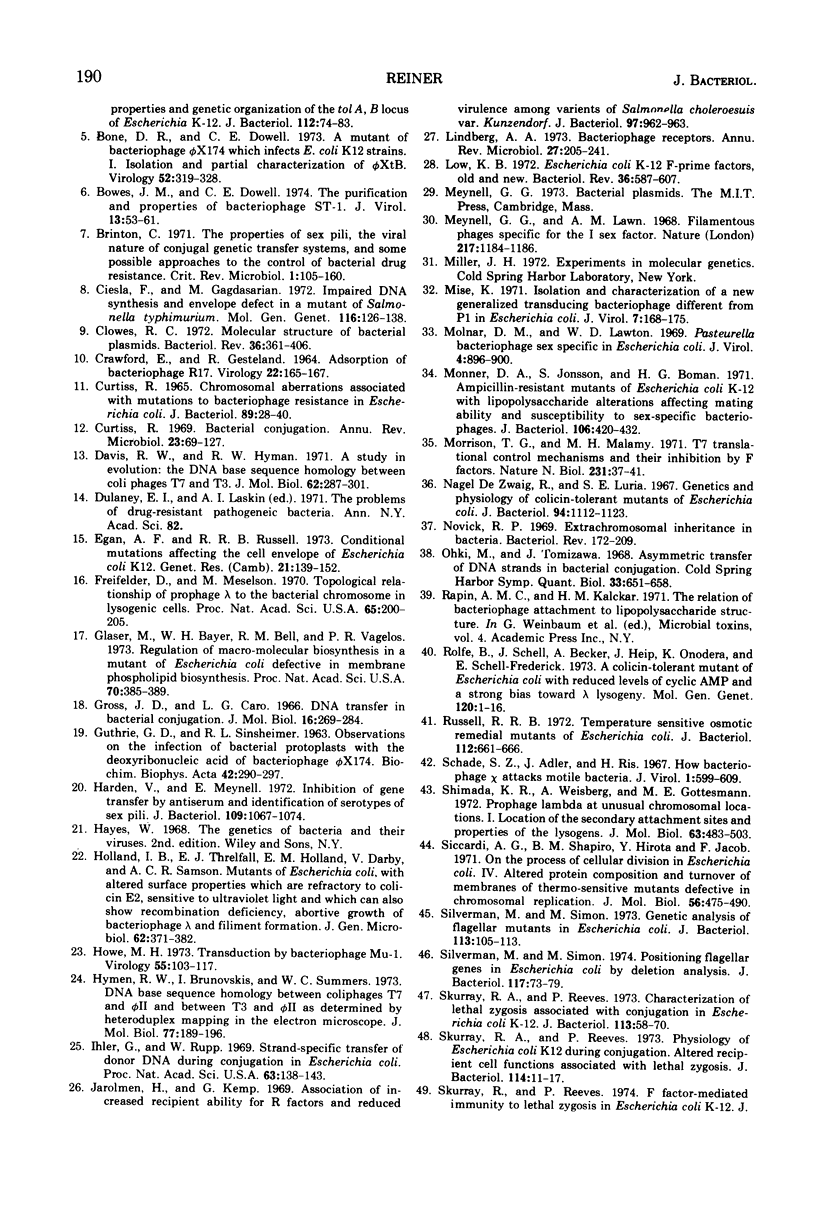
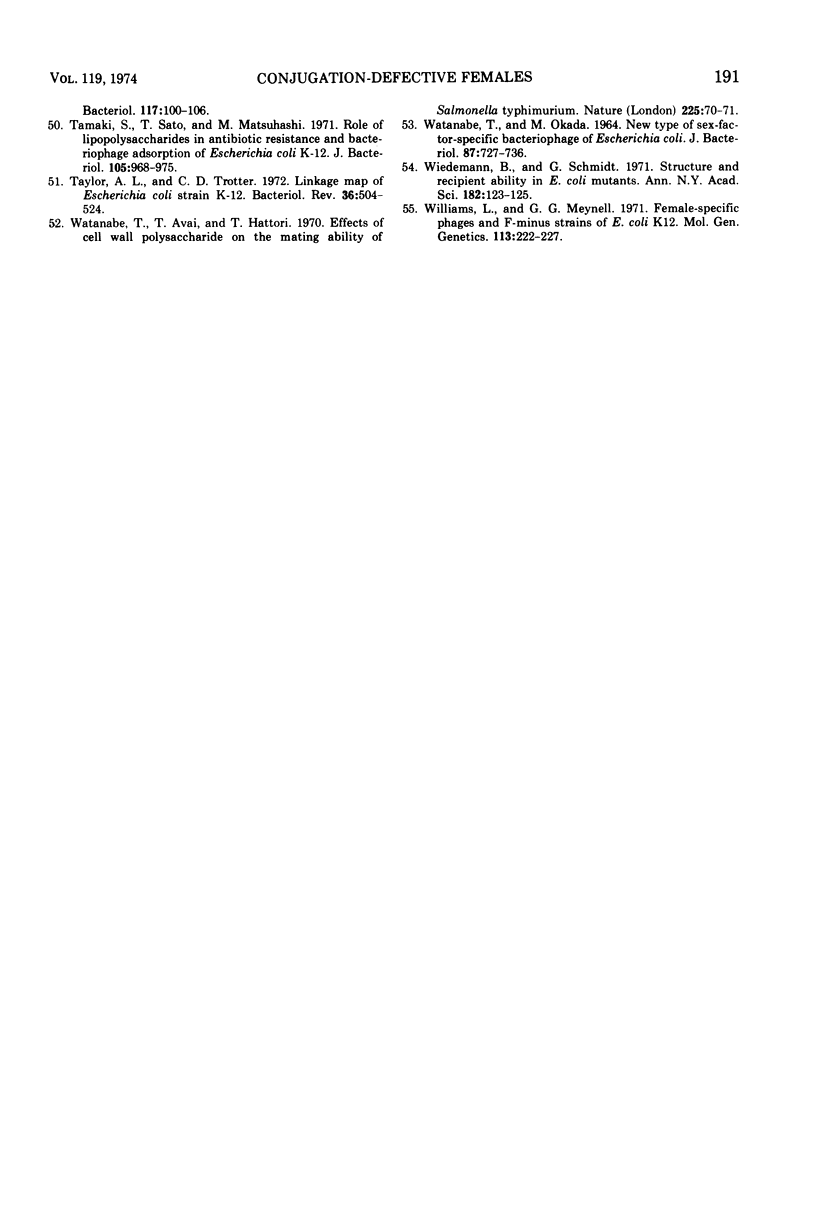
Selected References
These references are in PubMed. This may not be the complete list of references from this article.
- ALFOLDI L., JACOB F., WOLLMAN E. L. Zygose létale dans des croisements entre souches colicinogènes et non colicinogènes d'Escherichia coli. C R Hebd Seances Acad Sci. 1957 Jun 12;244(24):2974–2977. [PubMed] [Google Scholar]
- Achtman M. Genetics of the F sex factor in enterobacteriaceae. Curr Top Microbiol Immunol. 1973;60:79–123. doi: 10.1007/978-3-642-65502-9_3. [DOI] [PubMed] [Google Scholar]
- Armstrong J. B., Adler J., Dahl M. M. Nonchemotactic mutants of Escherichia coli. J Bacteriol. 1967 Jan;93(1):390–398. doi: 10.1128/jb.93.1.390-398.1967. [DOI] [PMC free article] [PubMed] [Google Scholar]
- Bone D. R., Dowel C. E. A mutant of bacteriophage øX174 which infects E. coli K12 strains. I. Isolation and partial characterization of øXtB. Virology. 1973 Apr;52(2):319–329. [PubMed] [Google Scholar]
- Bowes J. M., Dowell C. E. Purification and some properties of bacteriophage ST-1. J Virol. 1974 Jan;13(1):53–61. doi: 10.1128/jvi.13.1.53-61.1974. [DOI] [PMC free article] [PubMed] [Google Scholar]
- Brinton C. C., Jr The properties of sex pili, the viral nature of "conjugal" genetic transfer systems, and some possible approaches to the control of bacterial drug resistance. CRC Crit Rev Microbiol. 1971 May;1(1):105–160. doi: 10.3109/10408417109104479. [DOI] [PubMed] [Google Scholar]
- CURTIS S. R., 3rd CHROMOSOMAL ABERRATIONS ASSOCIATED WITH MUTATIONS TO BACTERIOPHAGE RESISTANCE IN ESCHERICHIA COLI. J Bacteriol. 1965 Jan;89:28–40. doi: 10.1128/jb.89.1.28-40.1965. [DOI] [PMC free article] [PubMed] [Google Scholar]
- Cieśla Z., Bagdassarian M. Imparired DNA synthesis and envelope defect in a mutant of Salmonella typhimurium. Mol Gen Genet. 1972;116(2):126–138. doi: 10.1007/BF00582222. [DOI] [PubMed] [Google Scholar]
- Clowes R. C. Molecular structure of bacterial plasmids. Bacteriol Rev. 1972 Sep;36(3):361–405. doi: 10.1128/br.36.3.361-405.1972. [DOI] [PMC free article] [PubMed] [Google Scholar]
- Curtiss R., 3rd Bacterial conjugation. Annu Rev Microbiol. 1969;23:69–136. doi: 10.1146/annurev.mi.23.100169.000441. [DOI] [PubMed] [Google Scholar]
- Davis R. W., Hyman R. W. A study in evolution: the DNA base sequence homology between coliphages T7 and T3. J Mol Biol. 1971 Dec 14;62(2):287–301. doi: 10.1016/0022-2836(71)90428-1. [DOI] [PubMed] [Google Scholar]
- Egan A. F., Russell R. R. Conditional mutations affecting the cell envelope of Escherichia coli K-12. Genet Res. 1973 Apr;21(2):139–152. doi: 10.1017/s001667230001332x. [DOI] [PubMed] [Google Scholar]
- Freifelder D., Meselson M. Topological relationship of prophage lambda to the bacterial chromosome in lysogenic cells. Proc Natl Acad Sci U S A. 1970 Jan;65(1):200–205. doi: 10.1073/pnas.65.1.200. [DOI] [PMC free article] [PubMed] [Google Scholar]
- GUTHRIE G. D., SINSHEIMER R. L. Observations on the infection of bacterial protoplasts with the deoxyribonucleic acid of bacteriophage phi X174. Biochim Biophys Acta. 1963 Jun 25;72:290–297. [PubMed] [Google Scholar]
- Glaser M., Bayer W. H., Bell R. M., Vagelos P. R. Regulation of macromolecular biosynthesis in a mutant of Escherichia coli defective in membrane phospholipid biosynthesis. Proc Natl Acad Sci U S A. 1973 Feb;70(2):385–389. doi: 10.1073/pnas.70.2.385. [DOI] [PMC free article] [PubMed] [Google Scholar]
- Gross J. D., Caro L. G. DNA transfer in bacterial conjugation. J Mol Biol. 1966 Apr;16(2):269–284. doi: 10.1016/s0022-2836(66)80172-9. [DOI] [PubMed] [Google Scholar]
- Harden V., Meynell E. Inhibition of gene transfer by antiserum and identification of serotypes of sex pili. J Bacteriol. 1972 Mar;109(3):1067–1074. doi: 10.1128/jb.109.3.1067-1074.1972. [DOI] [PMC free article] [PubMed] [Google Scholar]
- Howe M. M. Transduction by bacteriophage MU-1. Virology. 1973 Sep;55(1):103–117. doi: 10.1016/s0042-6822(73)81012-8. [DOI] [PubMed] [Google Scholar]
- Hyman R. W., Brunovskis I., Summers W. C. DNA base sequence homology between coliphages T7 and phiII and between T3 and phiII as determined by heteroduplex mapping in the electron microscope. J Mol Biol. 1973 Jun 25;77(2):189–196. doi: 10.1016/0022-2836(73)90330-6. [DOI] [PubMed] [Google Scholar]
- Ihler G., Rupp W. D. Strand-specific transfer of donor DNA during conjugation in E. coli. Proc Natl Acad Sci U S A. 1969 May;63(1):138–143. doi: 10.1073/pnas.63.1.138. [DOI] [PMC free article] [PubMed] [Google Scholar]
- Jarolmen H., Kemp G. Association of increased recipient ability for R factors and reduced virulence among variants of Salmonella choleraesuis var. kunzendorf. J Bacteriol. 1969 Feb;97(2):962–963. doi: 10.1128/jb.97.2.962-963.1969. [DOI] [PMC free article] [PubMed] [Google Scholar]
- Lindberg A. A. Bacteriophage receptors. Annu Rev Microbiol. 1973;27:205–241. doi: 10.1146/annurev.mi.27.100173.001225. [DOI] [PubMed] [Google Scholar]
- Low K. B. Escherichia coli K-12 F-prime factors, old and new. Bacteriol Rev. 1972 Dec;36(4):587–607. doi: 10.1128/br.36.4.587-607.1972. [DOI] [PMC free article] [PubMed] [Google Scholar]
- Meynell G. G., Lawn A. M. Filamentous phages specific for the I sex factor. Nature. 1968 Mar 23;217(5134):1184–1186. doi: 10.1038/2171184a0. [DOI] [PubMed] [Google Scholar]
- Mise K. Isolation and characterization of a new generalized transducing bacteriophage different from P1 in Escherichia coli. J Virol. 1971 Jan;7(1):168–175. doi: 10.1128/jvi.7.1.168-175.1971. [DOI] [PMC free article] [PubMed] [Google Scholar]
- Molnar D. M., Lawton W. D. Pasteurella Bacteriophage Sex Specific in Escherichia coli. J Virol. 1969 Dec;4(6):896–900. doi: 10.1128/jvi.4.6.896-900.1969. [DOI] [PMC free article] [PubMed] [Google Scholar]
- Monner D. A., Jonsson S., Boman H. G. Ampicillin-resistant mutants of Escherichia coli K-12 with lipopolysaccharide alterations affecting mating ability and susceptibility to sex-specific bacteriophages. J Bacteriol. 1971 Aug;107(2):420–432. doi: 10.1128/jb.107.2.420-432.1971. [DOI] [PMC free article] [PubMed] [Google Scholar]
- Morrison T. G., Malamy M. H. T7 translational control mechanisms and their inhibiton by F factors. Nat New Biol. 1971 May 12;231(19):37–41. doi: 10.1038/newbio231037a0. [DOI] [PubMed] [Google Scholar]
- Nagel de Zwaig R., Luria S. E. Genetics and physiology of colicin-tolerant mutants of Escherichia coli. J Bacteriol. 1967 Oct;94(4):1112–1123. doi: 10.1128/jb.94.4.1112-1123.1967. [DOI] [PMC free article] [PubMed] [Google Scholar]
- Ohki M., Tomizawa J. Asymmetric transfer of DNA strands in bacterial conjugation. Cold Spring Harb Symp Quant Biol. 1968;33:651–658. doi: 10.1101/sqb.1968.033.01.074. [DOI] [PubMed] [Google Scholar]
- Rolfe B., Schell J., Becker A., Heip J., Onodera K., Schell-Frederick E. A colicin-tolerant mutant of Escherichia coli with reduced levels of cyclic AMP and a strong bias towards lambda lysogeny. Mol Gen Genet. 1973 Jan 18;120(1):1–16. doi: 10.1007/BF00332980. [DOI] [PubMed] [Google Scholar]
- Russell R. R. Temperature-sensitive osmotic remedial mutants of Escherichia coli. J Bacteriol. 1972 Nov;112(2):661–665. doi: 10.1128/jb.112.2.661-665.1972. [DOI] [PMC free article] [PubMed] [Google Scholar]
- Schade S. Z., Adler J., Ris H. How bacteriophage chi attacks motile bacteria. J Virol. 1967 Jun;1(3):599–609. doi: 10.1128/jvi.1.3.599-609.1967. [DOI] [PMC free article] [PubMed] [Google Scholar]
- Shimada K., Weisberg R. A., Gottesman M. E. Prophage lambda at unusual chromosomal locations. I. Location of the secondary attachment sites and the properties of the lysogens. J Mol Biol. 1972 Feb 14;63(3):483–503. doi: 10.1016/0022-2836(72)90443-3. [DOI] [PubMed] [Google Scholar]
- Siccardi A. G., Shapiro B. M. On the process of cellular division in Escherichia coli. IV. Altered protein composition and turnover of the membranes of thermosensitive mutants defective in chromosomal replication. J Mol Biol. 1971 Mar 28;56(3):475–490. doi: 10.1016/0022-2836(71)90395-0. [DOI] [PubMed] [Google Scholar]
- Silverman M., Simon M. Genetic analysis of flagellar mutants in Escherichia coli. J Bacteriol. 1973 Jan;113(1):105–113. doi: 10.1128/jb.113.1.105-113.1973. [DOI] [PMC free article] [PubMed] [Google Scholar]
- Silverman M., Simon M. Positioning flagellar genes in Escherichia coli by deletion analysis. J Bacteriol. 1974 Jan;117(1):73–79. doi: 10.1128/jb.117.1.73-79.1974. [DOI] [PMC free article] [PubMed] [Google Scholar]
- Skurray R. A., Reeves P. Characterization of lethal zygosis associated with conjugation in Escherichia coli K-12. J Bacteriol. 1973 Jan;113(1):58–70. doi: 10.1128/jb.113.1.58-70.1973. [DOI] [PMC free article] [PubMed] [Google Scholar]
- Skurray R. A., Reeves P. F factor-mediated immunity to lethal zygosis in Escherichia coli K-12. J Bacteriol. 1974 Jan;117(1):100–106. doi: 10.1128/jb.117.1.100-106.1974. [DOI] [PMC free article] [PubMed] [Google Scholar]
- Skurray R. A., Reeves P. Physiology of Escherichia coli K-12 during conjugation: altered recipient cell functions associated with lethal zygosis. J Bacteriol. 1973 Apr;114(1):11–17. doi: 10.1128/jb.114.1.11-17.1973. [DOI] [PMC free article] [PubMed] [Google Scholar]
- Tamaki S., Sato T., Matsuhashi M. Role of lipopolysaccharides in antibiotic resistance and bacteriophage adsorption of Escherichia coli K-12. J Bacteriol. 1971 Mar;105(3):968–975. doi: 10.1128/jb.105.3.968-975.1971. [DOI] [PMC free article] [PubMed] [Google Scholar]
- Taylor A. L., Trotter C. D. Linkage map of Escherichia coli strain K-12. Bacteriol Rev. 1972 Dec;36(4):504–524. doi: 10.1128/br.36.4.504-524.1972. [DOI] [PMC free article] [PubMed] [Google Scholar]
- WATANABE T., OKADA M. NEW TYPE OF SEX FACTOR-SPECIFIC BACTERIOPHAGE OF ESCHERICHIA COLI. J Bacteriol. 1964 Mar;87:727–736. doi: 10.1128/jb.87.3.727-736.1964. [DOI] [PMC free article] [PubMed] [Google Scholar]
- Watanabe T., Arai T., Hattori T. Effects of cell wall polysaccharide on the mating ability of Salmonella typhimurium. Nature. 1970 Jan 3;225(5227):70–71. doi: 10.1038/225070a0. [DOI] [PubMed] [Google Scholar]
- Wiedemann B., Schmidt G. The problems of drug-resistant pathogenic bacteria. Experimental and clinical aspects of resistance determinants. Structure and recipient ability in E. Coli mutants. Ann N Y Acad Sci. 1971 Jun 11;182:123–125. doi: 10.1111/j.1749-6632.1971.tb30651.x. [DOI] [PubMed] [Google Scholar]
- Williams L., Meynell G. G. Female-specific phages and F-minus strains of Escherichia coli K12. Mol Gen Genet. 1971;113(3):222–227. doi: 10.1007/BF00339542. [DOI] [PubMed] [Google Scholar]


